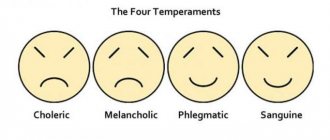Everyone has a chance to face boredom, lack of desire to do anything and loss of motivation. Most people experience at times apathy, lethargy and fatigue, when they want to lie on the couch and do nothing. This condition is akin to depression, many people say: “I’m depressed,” although true depression, unlike apathy, is a disease that affects both the psyche and physiology. Psychotherapists treat depression. A person whose picture of the world has lost the colors of life and has become faded does not know how to get rid of depression and apathy, and the situation is aggravated by the lack of will to action. Apathetic depression makes a person literally give up. But there is a way out of the situation.
To normalize the situation, let’s figure out what kind of condition has overtaken us. What is it - apathy or depression? Banal laziness is also possible.
Apathy or depression: what's the difference?
If a person who filled every day with interesting things went to bed with a feeling of regret that there are only 24 hours in a day, which are not enough to implement plans, suddenly begins to ignore the alarm clock, becomes indifferent to the things that previously fascinated him, and stops dreaming, you should take a closer look at it.
The first thing that needs to be ruled out is the development of the disease. Thus, depression often accompanies cancer. Depression occurs when a person suffers from pain, such as joint pain or recurring migraines.
Are there any obvious health problems? This means that it is necessary to understand why apathy, melancholy and depression haunt the sufferer. Here are 3 possible states that “steal” the joy of life:
- laziness;
- apathy;
- depression.
The first case is easy. Laziness “attacks” most often due to the reluctance to perform a specific action. A person can shirk cleaning the apartment, but willingly responds to a friend’s offer to go to a movie or a cafe.
The mood does not suffer; slight sadness is possible, which quickly disappears if it is replaced by positive emotions. A person does not lose the ability to react emotionally to his surroundings, and his emotions correspond to what is happening.
Everyone has their own methods of dealing with laziness. Most often, motivation in the form of a gift to yourself for completing an unpleasant action helps. And after doing it, the mood improves.
Apathy is more complicated. It takes from two to three hours to seven to ten days. The main sign is a complete reluctance to do anything. The driving force is the desire to lie on the couch and indulge in one’s own thoughts, which often have a sad tint. The reasons for the development of apathy are:
- moral exhaustion, “burnout”;
- physical fatigue;
- serious crisis (divorce, job loss);
- death of a loved one.
A person finds himself in a closed world of his own experiences, it seems to him that things will not get better, he wants to be left alone.
Depending on the causes of apathy, you need to:
- change your type of activity, add physical activity;
- it’s commonplace to rest, leave for a while, “switch”;
- experience negative emotions, accept a new situation, give yourself time to get used to it;
- wait it out, exclude communication for a couple of days, put things off.
Apathy usually goes away on its own. It rarely lasts for more than a couple of weeks. Drug treatment is not required, you need rest and attention to yourself, identifying your true desires, which may be “buried” under a layer of many responsibilities and provoke melancholy and dissatisfaction.
Apathy and depression can go hand in hand. This case already requires close attention and contacting a psychologist. In the first stages, you can help the patient without using medications, only through psychological methods. One of the experienced specialists in this field is Nikita Valerievich Baturin, who has his own methods of getting rid of psychosomatic diseases, will help you understand the problem and solve it before it becomes really serious.
Apathetic depression does not happen overnight. It develops gradually, gripping a person more and more tenaciously. The course of the disease lasts for weeks and even years, and it may seem to the sick person that everything is fine, he is just tired, lost strength. Apathetic depression is not only a disturbance of the emotional background. Somatic and cerebral changes are also added (that is, physical ailments appear and problems with the blood vessels of the brain begin).
A Guide to Relieving Depression and Apathy
We all feel sad, moody, or lethargic from time to time, but some people experience these feelings intensely over long periods (weeks, months, or even years), sometimes for no apparent reason. Depression is not just a bad mood, but a serious illness that affects your physical and mental health.
Depression directly affects how you feel about yourself and makes life difficult every day. To get rid of it, there are various treatment methods - from self-help methods to qualified treatment. This article will be useful to you if the situation has not yet gotten out of control. Otherwise, you need to contact a specialist.
What is depression
Depression is a state of low mood and aversion to activity that can affect a person's thoughts, behavior, feelings generally, and self-esteem in particular. Depressed mood is a normal temporary reaction to life events such as the loss of a loved one, a job, or long-term exposure to stressful situations.
People with depressed mood may feel especially sad, anxious, or overwhelmed; they may also feel particularly hopeless, helpless, sad or worthless. Other prominent symptoms may include guilt, irritability, or anger.
The development of depression is influenced by factors:
- Life events : traumatic events in childhood, such as loss, neglect, mental, physical or sexual abuse, unequal parental treatment of children.
- Personality Traits : High levels of personality neuroticism increase the development of depressive symptoms and also make all types of depression diagnoses more likely. Depression itself is associated with low extraversion (and, correspondingly, high introversion).
- Medical treatment : Some medications directly or indirectly affect the development of depression.
- Non-psychiatric illnesses : Depression can be the result of a number of infectious diseases, nutritional deficiencies, neurological conditions and physiological problems.
- Psychiatric syndromes : A number of psychiatric syndromes are characterized by depressive mood as the main symptom.
Depression does not arise out of the blue; a person brings it upon himself. We can’t help but mention depression’s little sister, apathy, which can be an excellent symptom that something is going wrong in life. But if you take charge of yourself in a state of apathy, many problems can be avoided.
Apathy as a precursor to depression
Apathy is a lack of feeling, emotion, interest and concern. It is a state of indifference or suppression of emotions such as anxiety, excitement, motivation or passion. An apathetic person lacks interest in emotional, social, spiritual, philosophical or physical life and the world.
Apathy is not depression yet, but the condition is very close. In general, it is completely normal if it lasts 1-3 days and then goes away. This is a natural response to disappointment, despondency and stress. In response, apathy comes - a way to forget about these negative feelings. You should sound the alarm when you cannot get out of this state for about a week. The dangerous period begins from two weeks, then the risk of depression appears.
In short, if you start fighting apathy and do it right, you can forget about depression.
Although there are many practical tips for overcoming apathy, you won't be able to do it unless you change the direction of your thoughts. Apathy has physiological manifestations, but they are formed with the help of thought.
Motivation is the first to disappear. You don't want to do anything, goals seem meaningless, and life is boring. However, it is always worth remembering that this is temporary and not to focus on it. Despite drowsiness, laziness, fatigue, weakness and indifference to life, know that this will pass. To start, focus on what's inside your head, not outside of it. Although many psychologists advise doing the opposite (stop thinking and having fun), this seems more like burying the problem inside rather than solving it. Of course, it is impossible to constantly direct your attention inward, so balance. But it is necessary to identify the reasons and get to the root.
Find out the reason and start fighting it on a mental level. Whatever worries you (lack of money, family problems), understand that apathy is not the answer. Focus on solving problems rather than obsessing over it.
Only after such decisions have been made (which may only take one day), start moving more. It's amazing how everything changes when we force ourselves to dance, run or frolic. This is a law of the psyche: you cannot remain in two different states at the same time. If you feel apathy with characteristic symptoms, start doing the opposite: force yourself to experience emotions and move more. It is physical movement that is the best remedy for apathy.
You can also change your routine. What is he usually like? Change it either radically (if this is possible) or in small ways (if this is not possible). Sometimes the cause of apathy is the automaticity of our actions. Have lunch on the balcony, come to work in clothes that are completely unusual for you, read a book that you never thought of reading.
If you feel notes of depression in yourself, then you have overlooked the signs of apathy. Let's see what symptoms give it away.
Symptoms of depression
Depression causes feelings of sadness and loss of interest in things you once enjoyed. This can lead to various emotional and physical problems and reduce a person's ability to work.
Symptoms of depression range from mild to severe and may include:
- Feeling sad or depressed (it's simple: if you feel depressed, there is a real reason for it).
- Loss of interest and pleasure.
- Insomnia or oversleeping.
- Loss of energy and increased fatigue.
- Increased aimless physical activity or slower movement and speech.
- Feelings of worthlessness or guilt.
- Difficulty thinking, concentrating, or making decisions.
As we can see, there are many intersections with apathy and only the level of intensity, duration and destructiveness can indicate exactly what state a person is in.
Depression in women
Women are more likely than men to experience depression. Some studies show that one third of women will experience a major depressive episode in their lifetime (twice as many as men).
The peculiarity of depression in women is that they try on too many social roles: mother, wife, employee, friend, healer, guardian. The complexity of all these roles comes with ups and downs throughout life. In addition, the causes of mood swings can be physiological, for example due to hormonal surges during pregnancy. But in general, after some time the emotional level levels out.
However, if the symptoms do not disappear, the problem must be seriously addressed. Although the causes of depression may differ significantly between men and women, the treatment may be the same. Let's talk about this further.
How to get rid of depression
While there is no quick, one-time solution to overcoming depression, the following tips may help.
1
Create structure for your day
Lack of plans and inconsistency can increase feelings of helplessness and loss of control over the events and direction of your life. Planning regains control of the self and helps you get rid of the feeling that you are just a passive participant in your life.
The following guide will help you develop structure and evaluate whether you are managing your time well. Get a notebook in which you will write 5 columns:
- Time of day. You need to write information in your diary several times a day: immediately after waking up, late in the morning, before lunch, in the evening, before going to bed.
- What are you planning to do?
- What did you really do.
- How do you feel about what you did? Describe your feelings in a few words and rate them from 1 to 10.
- Situations and thoughts that can negatively affect your mood. Complete at the end of the day.
2
Tony Robbins' 90 Second Rule
Motivational speaker Tony Robbins believes that most people like to suffer, be depressed or apathetic. We are addicted to anger, loneliness, boredom, anxiety and much more simply because we believe (albeit unconsciously) that this will help us cope with the situation or pressure.
Robbins is confident that it only takes 90 seconds to formulate a problem correctly. Here's what to do.
- Find out which types of suffering are your favorite. You need to be extremely frank and answer this question honestly (and preferably alone, so as not to be tempted to defend yourself).
- Notice the thoughts that cause suffering and understand that external factors have virtually no significance. For example, thoughts about money can drive even a billionaire crazy. We become who we think we are. Thoughts about money and its lack seem to tell your consciousness, “You are poor and unhappy.” By focusing on them, you only make the problem worse.
- Determine that you are going to get out of depression and control your thoughts. The problem is that we do not make a clear decision, which means we do nothing to solve it. As soon as the final decision is made, as soon as you firmly decide to bring yourself back to normal, only then can you begin treatment.
- Even if all your plans fall apart and the worst possible situation comes true, this should not push you into the abyss of depression. You can't control 99% of the situations in your life, but you can control how you think and feel about it.
- Calm your breathing. Drop your shoulders. Notice how negative thoughts float through you without causing any harm to your psyche.
Robbins points out that for him, the 90-second rule was originally a four-hour or four-day rule. With experience, you will learn to put yourself in order in a matter of seconds and drive away depression.
3
The Stoic Method
The Stoics practiced mental exercises that trained their psyche. One of their best practices is to imagine the worst-case scenario. This does not mean believing, but it means reconciling.
If you could be fired from your job and you haven’t slept at night for a month, finally come to terms with this possibility and stop torturing yourself. Tell yourself, “Okay, I'm ready for this.” Once you do this, you will feel relief. Work through alternatives. Now if you get fired, you will know what you will do next. If you don’t get fired, you can move on with your life just fine.
The most important thing in this exercise is to relieve the tension that has accumulated in you and let go of the situation.
4
Gratitude Skill
Gratitude has a powerful therapeutic effect. Depression often occurs due to regrets about the past or fears about the future. When you are grateful, you are present and aware of how much you have now.
Instill this habit in yourself. There is nothing more effective than developing it immediately after waking up and before going to bed. When you wake up in the morning, take 10 minutes to remember what you have. The best thing to do is keep yourself a gratitude journal. Also try throughout the day to notice what you forgot to mention in the morning. And finally, the evening ritual. Go to sleep thinking about what you have. Staying in a state of gratitude for a long time automatically relieves you of regrets, fears and worries. Gratitude has an incredible ennobling effect on a person.
Here are some more tips.
Face your fears . Ignoring the problem and covering it up is not the answer. Call your fears by their proper names. Are you afraid to communicate with people? Realize that the problem is not with them, but with you, and begin to solve it.
Look around . Every person has one or another psychological problem. You are not alone. A little compassion helps heal your own wounds. We often become depressed when we consider ourselves the most unhappy people on the planet. However, it is not.
Meditate . It's worth it. Even if you have to spend tens of hours, sooner or later the practice will begin to yield excellent results. You will calm your mind and begin to be in the present, and this is exactly what will help you recover from depression.
Remember that you are constantly changing . Our habits change constantly. Even now, as you read this article, you are simultaneously acquiring several habits that you are not aware of. Remember that everything you do, feel and think becomes a habit.
Books about depression and getting rid of it
Here is a list of some good books. Not all of them directly talk about how to get rid of depression, but they give a person a feeling of freshness and force them to think seriously about its causes and how to overcome them.
- Viktor Frankl, Man's Search for Meaning.
- Leo Tolstoy "Confession".
- Alexander Lowen "Depression and the Body."
- Stanislav Grof "Spiritual Crisis".
- Ray Bradberry "Dandelion Wine"
- Ray Bradberry "A Cure for Melancholy"
- The Diary of Anne Frank.
- Martin Seligman, How to Learn to Be Optimistic.
- Harold Kushner "When Bad Things Happen to Good People."
- Richard O'Connor, Depression is Canceled.
- Tony Robbins "Unleash the Giant Within"
Also read biographies of great people. All of them, one way or another, went through many trials of fate. Find a book about someone you admire and read it for the experience.
We wish you good luck!
We also recommend reading:
- Storytelling
- Guilt
- 10 ways to get rid of apathy
- How to Prevent Stress and Depression from Tony Robbins
- Bipolar disorder: definition, causes, episodes, treatment
- Post-traumatic stress disorder: briefly about the most important things
- How to help your child cope with depression
- Properties of mental states
- Overcoming spiritual depression
- Signs of apathy and overcoming it
- Ways to determine hidden depression
Key words:1Psychoregulation
Symptoms of apathetic depression
Symptoms of apathetic depression include the following:
- lack of emotional response to any events (positive or negative);
- detached perception of events that are objectively important for the individual;
- decreased motivation;
- reduced need for communication;
- low physical activity, feeling of muscle weakness.
Apathetic (as well as other types) depression is characterized by a deterioration in the morning and some improvement in the evening. To the listed symptoms of apathetic depression are added the absence or loss of appetite and weight loss. Sometimes the picture is the opposite: a person begins to eat an unusual amount, then his weight increases, but this does not bother him.
Characteristic signs of apathy and depression include a complete loss of interest in what previously occupied and worried a person.
How to overcome stress and depression
The question of how to overcome stress and depression is very relevant. Methods that help relieve stress and depression can be divided into three groups: psychotherapeutic, pharmacological and non-medicinal.
Typically, positive results are achieved by simultaneously using several techniques that complement each other.
No. 1 Psychotherapeutic method
Involves helping in finding a way out of behavioral traps that lead to depression. The psychologist recommends catching the negative element in your behavior and thoughts. Together you will find ways to resist this condition.
Therapy is aimed at eliminating the symptoms of the disease. Helps to adapt socially. Enhances the effectiveness of tablets against stress and depression. Minimizes the likelihood of relapse.
Art therapy helps overcome isolation and shyness. Get rid of severe disturbances in the emotional sphere. Develop communication skills.
Art therapy is often understood as treatment through the use of fine art. This also includes therapy using music, dance, film, photography, theater and other creative forms.
No. 2 Pharmacological agents
For severe forms of depression, a psychiatrist may prescribe prescription medications:
- Tranquilizers. Such drugs suppress emotions. They help get rid of anxiety, phobias, and fear. May be addictive.
- Antidepressants. Allows you to cope with suicidal thoughts. With a depressed mood. With inhibition of thought processes.
- Neuroleptics. The drugs are used for neuroses. They act on the central nervous system, causing its inhibition. They calm you down. Helps improve sleep. Muscle relaxation.
- Nootropics. These medications improve blood circulation and stimulate brain activity. Due to this, they contribute to increased resistance to heavy loads. Improves memory and mood. Prevents the occurrence of depression. There are also over-the-counter nootropics. For example, the well-known “Glycine”.
The listed remedies are “heavy artillery” (except for nootropics). Use strictly under medical supervision. And they are prescribed only in cases where there is no other choice.
In most situations, drugs with a mild effect on the body are recommended. Which have much fewer contraindications and side effects. As a rule, these are plant-based products. Containing extract:
— Chamomile, valerian, motherwort and mint. They give a good sedative effect. Restore sleep patterns.
- Melissa - normalizes rapid heartbeat. Reduce blood pressure.
— Peony — stimulate the production of endorphins. Improves overall well-being.
— Rhodiola rosea, immortelle — relieve chronic fatigue and apathy.
- Ginseng, bait - increases performance. Increase vital activity.
In addition, vitamin and mineral complexes containing vitamins C and E, B vitamins, potassium, magnesium and calcium are recommended.
But it is worth remembering that even taking a very good remedy for depression and stress may not bring the desired result. If you do not adhere to the recommended dosage regimen and other doctor’s prescriptions.
No. 3 Non-medicinal methods
#1 Herbal medicine. Herbal treatment has been known to mankind since prehistoric times. When faced with stress and depression, we are talking about herbs:
- Sedative (that is, calming) effect - motherwort, valerian, hops, oregano, peony, heather, hawthorn;
- Stimulating action. Helping overcome depression and restore energy. Ginseng, eleutherococcus, St. John's wort, Rhodiola rosea, lemongrass, licewort, Leuzea, Aralia Manchurian.
Of course, severe depression cannot be overcome only with the help of herbal medicine. But it is quite possible to reduce stress or alleviate a mild form of depression.
#2 Relaxation training. For neuromuscular relaxation, regulation of breathing and blood circulation, not only psychological auto-training can be used.
But also systems of special physical exercises from yoga, Pilates and similar sports and health practices.
During training, muscle tension is primarily relieved. Which is typical for anxiety states.
Physical activity also promotes the production of anti-stress hormones - endorphins. As a result, sleep normalizes. Peace of mind is restored.
#3 Diet. If you are stressed or depressed, you should definitely include carbohydrates (fruits, vegetables, grains) in your diet. Proteins (chicken or turkey, fish, dairy products, soy). B vitamins (nuts, legumes). Amino acids (meat, fish, eggs, chocolate).
The list of “culinary antidepressants” includes red fish, green tea, nuts and seeds, bananas, seaweed, cocoa and turmeric. Such products stimulate the production of serotonin, the “happiness hormone”.
#4 Lifestyle correction. To overcome symptoms of stress and depression, it is important to normalize your waking and sleeping patterns. Work must be organized taking into account the need for regular rest.
If the job does not involve physical activity. Then, compensatory physical exercises are needed.
A good way to prevent depression and stress is to stay in the fresh air and sunbathing.
What can be accompanied by depression?
Apathetic depression is not only a low mood and a reluctance to communicate, a tendency to become tearful for no apparent reason. Somatic symptoms appear:
- headache;
- drowsiness or, on the contrary, insomnia - sleep disturbances;
- joint pain;
- muscle weakness;
- skin itching.
Memory may deteriorate and it is difficult for a person to concentrate. Lack of will appears: it becomes difficult to make a decision.
Problems begin at work associated with poor concentration.
Who may suffer from apathy or is at risk?
Apathetic disorder develops more often in women, the rate reaches 65%. Since men tend to hide their feelings and hold back their emotions in public, it is assumed that the study numbers do not reflect the true picture of the spread of the disease.
Based on research data, statistics show that the age range of those suffering from apathetic depression is wide; patients range in age from 18 to 70 years. More often, people aged 30-35 years are susceptible to the disorder. Depression is long-lasting, the average duration of the disease is 3-4 years.
Features of the disease
Having understood the difference between apathy and depression, we can define the latter. This is a state when there are no feelings, the patient is fully conscious, has not lost the ability to think and remember, but treats everything with indifference. This even applies to events that affect aspects of vital importance to him.
One of the classifications of depression, where apathy plays a leading role:
- apathetic subtype (lack of motivation and desires);
- apathetic-melancholy subtype (prevalence of melancholy, self-deprecating attitude);
- apathetic-anxious subtype (increased anxiety, accompanied by vegetative manifestations - fainting, tachycardia, gastrointestinal disorders).
Patients are not bothered by the question of how to get rid of apathy and depression in everything, or rather, they can ask this question to a doctor or relatives, but they themselves consider their case hopeless.
Apathetic depression can be organic, that is, caused by dysfunction of any organs or systems of the body.
Signs
With apathetic depression, the patient may experience the following conditions:
- monotony of speech;
- poverty of facial expressions;
- slow movements;
- feeling of detachment;
- internal discomfort;
- hopelessness;
- anxiety.
A person can continue to lead his usual lifestyle, but at the same time feel a sense of detachment from everything and be in his own world. Internal anxiety, a feeling of hopelessness and despair grows. Lethargy and indifference to early interests and activities appear. Gloomy depression and awareness of change are masked under the mask of indifference.
What is organic depression and how is it treated?
Organic forms are divided into forms:
- dementia;
- atherosclerotic;
- epileptic;
- post-traumatic.
Diseases such as Parkinson's and Alzheimer's disease, uncompensated hypertension, epilepsy can lead to permanent depression and apathy. What to do in this case? You will not be able to get rid of the disease on your own. First of all, the efforts of doctors will be aimed at treating or leading to remission of the underlying disease. Then depressive symptoms will decrease.
Depression with a hangover stands apart. In true alcoholics, melancholy and a feeling of hopelessness develop in the absence of a daily “dose”, during abstinence, and this is due to organic disorders. Those who simply “had too much” at a party develop a feeling of guilt and causeless severe sadness. The reason is poisoning of the body with alcohol breakdown products. This is a passing condition and usually does not require help.
Causes of depression
Social disadvantage can also affect the psyche: lack of professional success, dissatisfaction with one’s appearance.
Several factors contribute to depression:
- Biochemistry. With depression, brain activity and neurotransmitters change.
- Genetics. The influence of heredity on the development of depression was studied using the example of bipolar disorder. Direct relatives of bipolar patients are 15 times more likely to develop depression than relatives of healthy people. If one parent has the disorder, children experience depression in 25% of cases; if both parents - in 75% (Minutko V.L., “Depression”).
- Personal characteristics. People with low self-esteem may think that they are not worthy of love and recognition. With pronounced perfectionism, all energy is aimed at achieving an ideal result - burnout occurs. Individuals prone to dependence in relationships and living their lives through another person are also prone to depression: losing awareness of themselves as a separate unit and not leaving themselves personal space, when parting, they experience the loss of a loved one as the loss of themselves.
- External factors. Low standards of living and security in the country, social characteristics of the state (for example, oppression of minorities), incidents of violence (both physical and psychological), and the loss of a loved one can make a person more vulnerable to depression if he was initially predisposed to affective disorders.
Treatment of depression through the efforts of a specialist
A psychotherapist will tell you how to get rid of depression and the apathy that accompanies it. There is no single scheme; the following must be taken into account:
- reasons for development;
- duration of flow;
- severity of the episode;
- presence of concomitant diseases.
The doctor usually focuses on the use of antidepressants. Sometimes monotherapy is possible, sometimes a combination of different medications is required - not only antidepressants, but also antipsychotics, nootropics. Thimostabilizers may be needed. Only the doctor selects the drug and its quantity!
In addition, psychotherapy techniques are necessarily used during treatment.
The question of how to get rid of apathy, depression and laziness on your own sounds incorrect, since it combines three different conditions at once. If laziness and apathy can be overcome on your own, then only a specialist should work with depressive states.
Depression in women
According to statistics, there are 2 times more documented cases of depression in women than in men (Tyuvina et al., “Gender characteristics of depressive disorders in women”). The cause of depression in women can be hormonal changes: changes in the menstrual cycle, pregnancy, miscarriages, the postpartum or premenopausal period, menopause.
Also, depressive disorders may include premenstrual dysphoric disorder, when a woman becomes depressed before the start of her cycle - more pronounced than with typical premenstrual syndrome (PMS).
A separate form is postpartum depression, which affects 13% of mothers. 50% of them had depressive tendencies even before pregnancy.
Young mothers spend enormous energy caring for their children, and therefore forget about themselves and their mental state. This is fraught with eating disorders, sleep disorders and other symptoms.
Before a woman fights depression on her own, it is recommended to consult a specialist. Maternal depressive disorder leads to disruption of the interaction between mother and child, which can lead to deviations in mental, emotional and physical development.
Complications
What will happen to a person who has not received help if it is, after all, depression? The disease will continue for years, becoming increasingly worse. It is possible to develop schizophrenia (sometimes depression occurs as a precursor), and the worst outcome is that a person may commit suicide. He doesn’t see a way out, but motivation is like: “Pull yourself together!” meaningless. The patient is physically unable to mobilize himself. Such a call is akin to the sentence “Get out of the wheelchair and walk!” addressed to a paralyzed patient.
Depression in men
Perhaps the low number of reported cases of depression in men is associated with the stigmatization of this disorder in men (stereotypes such as “a man should be strong”, “a man should not worry about problems, but solve them”, etc.). This makes it more difficult for men to understand how to deal with depression and admit to having an emotion-related illness.
In some cases, depression is unconsciously masked by irritability and aggression, immersion in work and career, alcoholism and other addictions.
Depression apathy
Apathy often breeds depression. Whether to treat it or not is of interest to many people. If the condition has persisted and you do not know how to get rid of it, then do not hesitate and seek help from a doctor.
Signs that should alert you first of all are emotional disorders, slow thinking, low mood, decreased motor activity. It is important that these signs are observed for a long time. Often the concepts of depression and apathy are confused with chronic fatigue syndrome. In the second case, the cause of the disease is physical fatigue, and not external causes.
Depression - apathy has a variety of clinical manifestations. This is a loss of interest in the outside world, somatic manifestations of physical discomfort, intestinal disorders, headaches. A feature of depression and apathy is that patients can spend a very long time being examined by various specialists, but only psychiatrists can prescribe effective treatment.
Depression - apathy occurs due to stressful situations and psychological trauma. However, it happens that these signs appear for endogenous reasons: disorders occur due to a lack of serotonin production in the brain. Treatment includes antidepressants and psychotherapy.
How to cure depression with medication
To achieve the best effect in the treatment of a patient with a psychological disorder, it is necessary to strictly follow all doctor’s prescriptions. It is almost impossible to cure depression without antidepressants. But you shouldn’t use medications thoughtlessly. All medications can only be prescribed by a specialist. The drug itself, its dosage and treatment regimen are determined by the doctor depending on the form of the disease, its duration, the patient’s condition and related factors.
The most commonly prescribed antidepressants are:
- "Paxil."
- “Marplan.
- "Asendil."
- "Celexa."
- "Mirtazapine."
- "Fluoxetine."
- "Diazepam."









